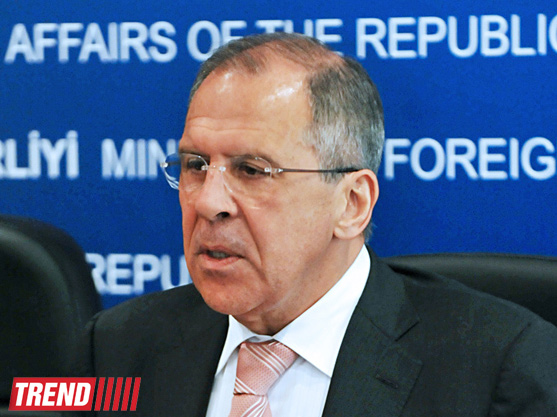The OSCE Minsk Group is exerting extra efforts for the Nagorno-Karabakh conflict sides to pass a document including the political principles of the conflict settlement, Russian Foreign Minister Sergei Lavrov said on Aug. 4, ITAR-TASS reported.
"Of course, we are concerned about the so-called contact line [in Nagorno-Karabakh]," he said. "The parties accuse each other of provocative actions. This has happened before too. Unfortunately, we have seen periodic outbreaks for many years. But this time all this is acutely perceived and presented. Many people were killed. Along with other countries, including the OSCE Minsk Group co-chairing countries, Russia, as well as the U.S, France, urged the parties to show maximum restraint, to avoid any actions that could lead to violence. "
"Separate meetings are planned to be held with the Armenian president and then the Azerbaijani president in Sochi at the end of this week," he said. "When they will be in one place, at one time, perhaps, the Nagorno-Karabakh will be discussed. "But the format of this meeting depends on us. "
"Of course, we will talk with our partners from Azerbaijan and Armenia how the OSCE Minsk Group, co-chairmen can help build confidence and reduce the risk of confrontation," Lavrov added.
"The conflict is perceived very emotionally by both sides. As one of the co-chairs of OSCE Minsk Group, we have made many efforts jointly with our U.S. and French partners to help to resolve the problems that for present hinder the signing of an agreement reflecting the political principles for the settlement, to bring these issues up to the mark that the sides could form a package acceptable for them".
The minister stressed that the adoption of such a political statement "reflecting the guiding principles for the conflict settlement would undoubtedly promote the normalization of the atmosphere".
"It is not an easy task. There have been made many efforts with this regard and every time it seemed that we are about to come to an important stage and the agreement will be signed, but something hindered this. Therefore, I won't make predictions," Lavrov stressed.
He also pointed out that it is important to persistently and stubbornly continue to help Armenians and Azerbaijanis seek "formulations that will be suitable for some, and for others."
Lavrov stressed that some time ago, during a meeting between Russian, Azerbaijani and Armenian presidents, the parties agreed on a "rather modest statement with the understanding that there is a need to develop confidence-building measures".
"If there are any firefights, the parties need to exchange the bodies, captives and basically agree on some diplomatic steps that would have calmed the situation on the contact line," he said.
Earlier, Armenian Prime Minister Hovik Abrahamyan said that Azerbaijani President Ilham Aliyev and Armenian President Serzh Sargsyan will meet in Sochi on Aug.8 or Aug.9 to hold negotiations on the Nagorno-Karabakh settlement.
Armenian armed forces launched a diversion on the night of July 31-August 1, when reconnaissance and sabotage groups tried to cross the contact line of the Azerbaijani and Armenian troops through the territories of Aghdam and Terter regions.
Armenia's reconnaissance and sabotage group attacked the positions of Azerbaijani armed forces in the direction of Azerbaijan's Aghdam and Agdere regions on the night of August 1-2. Azerbaijan managed to locate the group and the sabotage attempt was prevented.
During the last four days, Azerbaijani positions have been constantly under attack, and 13 servicemen have been killed, several more were wounded. The Armenian side suffered more losses while trying to hide this fact from the public.
The conflict between the two South Caucasus countries began in 1988 when Armenia made territorial claims against Azerbaijan. As a result of the ensuing war, in 1992 Armenian armed forces occupied 20 percent of Azerbaijan, including the Nagorno-Karabakh region and seven surrounding districts.
The two countries signed a ceasefire agreement in 1994. The co-chairs of the OSCE Minsk Group, Russia, France and the U.S. are currently holding peace negotiations.
Armenia has not yet implemented the U.N. Security Council's four resolutions on the liberation of the Nagorno-Karabakh and the surrounding regions.






